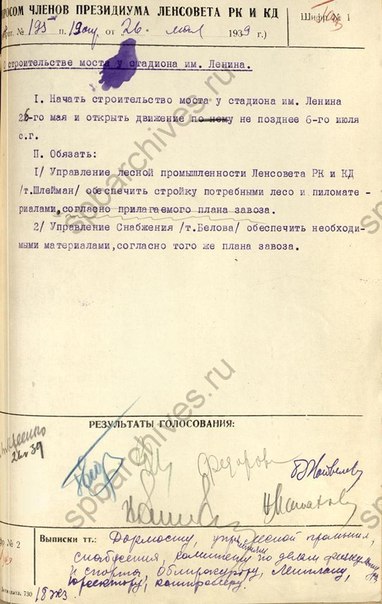Тяжела и неказиста жизнь предлога с маргинальным управлением в русском языке. «Согласно чему? или согласно чего?» — вот самый популярный вопрос в Службе русского языка, где я дежурю иногда. Его задают постоянно, люди очень путаются и никак не могут запомнить правильно: согласно приказу, согласно распоряжению и т.д.
А вот смотрите. Back in USSR. Еще один документ с выставки про мосты. 1939 год: «Обеспечить необходимыми материалами, согласно того же плана завоза». Аааа, родительный падеж, режет слух! Значит уже тогда!
Или правильнее, насколько я понимаю, сказать «еще тогда». Просмотрев бегло по корпусу сочетания с этим предлогом, убедилась, что еще в 1920-1930-е говорить «согласно приказа» было вполне нормальным (но не нормативным, Ушаков уже запрещает). Такое ощущение, что все источники корпуса на тот период разделились на две категории — великая русская литература (TM) и гроссбухи с документацией. И М. Пришвин с П. Флоренским дружно пишут «согласно» с дательным падежом, как нас учили. А вояки и прочие — четко с родительным: «согласно проекта», «согласно постановления», «согласно данных разведки».
Современная норма сурова и неумолима — только дательный, только «чему». Родительный падеж на каком-то сайте обозвали устаревшим. А между тем я вот пока не понимаю, почему из двух вариантов отдали предпочтение дательному — он ведь более редкий, в том смысле, что чаще предлоги с родительным употребляются, поэтому, кмк, всех и тянет на него соскочить. И тот факт, что ошибка встречается постоянно даже сейчас, показывает, что не ложится этот падеж в систему языка, путает людей как ни крути. Или все же уже норм, все привыкли и родительный режет слух? Что скажете?
http://spbarchives.ru/documents/10157/540707/5_1.JPG?t=1409156958640
А вот смотрите. Back in USSR. Еще один документ с выставки про мосты. 1939 год: «Обеспечить необходимыми материалами, согласно того же плана завоза». Аааа, родительный падеж, режет слух! Значит уже тогда!
Или правильнее, насколько я понимаю, сказать «еще тогда». Просмотрев бегло по корпусу сочетания с этим предлогом, убедилась, что еще в 1920-1930-е говорить «согласно приказа» было вполне нормальным (но не нормативным, Ушаков уже запрещает). Такое ощущение, что все источники корпуса на тот период разделились на две категории — великая русская литература (TM) и гроссбухи с документацией. И М. Пришвин с П. Флоренским дружно пишут «согласно» с дательным падежом, как нас учили. А вояки и прочие — четко с родительным: «согласно проекта», «согласно постановления», «согласно данных разведки».
Современная норма сурова и неумолима — только дательный, только «чему». Родительный падеж на каком-то сайте обозвали устаревшим. А между тем я вот пока не понимаю, почему из двух вариантов отдали предпочтение дательному — он ведь более редкий, в том смысле, что чаще предлоги с родительным употребляются, поэтому, кмк, всех и тянет на него соскочить. И тот факт, что ошибка встречается постоянно даже сейчас, показывает, что не ложится этот падеж в систему языка, путает людей как ни крути. Или все же уже норм, все привыкли и родительный режет слух? Что скажете?
http://spbarchives.ru/documents/10157/540707/5_1.JPG?t=1409156958640
Difficult and unsightly life of a preposition with marginal control in the Russian language. “According to what? or according to what? ”is the most popular question in the Russian Language Service, where I am on duty sometimes. He is asked constantly, people get very confused and cannot remember correctly in any way: according to the order, according to the order, etc.
But look. Back in USSR. Another document from the exhibition about bridges. 1939: "Provide the necessary materials according to the same delivery plan." Ahhh, genitive, cuts off hearing! So already then!
Or more correctly, as far as I understand, to say "even then." After reviewing the combination of this excuse briefly on the body, I became convinced that even in the 1920s and 1930s it was quite normal to say “according to the order” (but not normative, Ushakov already forbids). It seems that all the sources of the corps at that time were divided into two categories - the great Russian literature (TM) and the ledger with documentation. And M. Prishvin and P. Florensky amicably write “agree” with the dative case, as we were taught. And the warriors and others - clearly with the genitive: “according to the project”, “according to the decree”, “according to intelligence data”.
The modern norm is harsh and implacable - only dative, only "what." The genitive case on some site was called obsolete. In the meantime, I don’t yet understand why of the two options they gave preference to the juvenile - it’s more rare, in the sense that it is more often that the prepositions with the genitive are used, therefore, kmk, everyone pulls him off. And the fact that the error occurs all the time, even now, shows that this case does not fall into the language system, it confuses people, no matter what. Or is it already the norm, everyone is accustomed and the genitive cuts hearing? What do you think?
http://spbarchives.ru/documents/10157/540707/5_1.JPG?t=1409156958640
But look. Back in USSR. Another document from the exhibition about bridges. 1939: "Provide the necessary materials according to the same delivery plan." Ahhh, genitive, cuts off hearing! So already then!
Or more correctly, as far as I understand, to say "even then." After reviewing the combination of this excuse briefly on the body, I became convinced that even in the 1920s and 1930s it was quite normal to say “according to the order” (but not normative, Ushakov already forbids). It seems that all the sources of the corps at that time were divided into two categories - the great Russian literature (TM) and the ledger with documentation. And M. Prishvin and P. Florensky amicably write “agree” with the dative case, as we were taught. And the warriors and others - clearly with the genitive: “according to the project”, “according to the decree”, “according to intelligence data”.
The modern norm is harsh and implacable - only dative, only "what." The genitive case on some site was called obsolete. In the meantime, I don’t yet understand why of the two options they gave preference to the juvenile - it’s more rare, in the sense that it is more often that the prepositions with the genitive are used, therefore, kmk, everyone pulls him off. And the fact that the error occurs all the time, even now, shows that this case does not fall into the language system, it confuses people, no matter what. Or is it already the norm, everyone is accustomed and the genitive cuts hearing? What do you think?
http://spbarchives.ru/documents/10157/540707/5_1.JPG?t=1409156958640

У записи 4 лайков,
0 репостов.
0 репостов.
Эту запись оставил(а) на своей стене Полина Оскольская

























